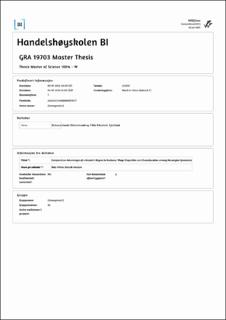Comparative Advantages of a Master's Degree in Business: Wage Disparities and Overeducation among Norwegian Graduates
Master thesis
Permanent lenke
https://hdl.handle.net/11250/3101991Utgivelsesdato
2023Metadata
Vis full innførselSamlinger
- Master of Science [1621]
Sammendrag
This research aims to investigate the comparative advantages of pursuing a master's degree in business ("Siviløkonom") over a bachelor's degree in terms of businessrelated
proficiencies and professional outcomes among Norwegian graduates.
Moreover, it seeks to examine gender disparities in these outcomes and scrutinize
the dynamic nature of wage disparities over time. By utilizing cross-sectional data
from Statistics Norway (SSB) and employing robust econometric techniques, this
study endeavors to measure the occurrence of overeducation by analyzing salary
differentials between individuals holding bachelor's and master's degrees in the field of business.
The findings underscore substantial wage disparities among business
graduates, even after controlling for various factors. Specifically, business graduates with a master's degree enjoy an average wage premium of 24.52% compared to
their counterparts with solely a bachelor's degree, thus indicating the enduring advantages of pursuing advanced education. Furthermore, pronounced gender disparities in wages are observed, with women earning 19.52% less than their male
counterparts, irrespective of educational attainment. However, female master's graduates demonstrate a significantly higher average wage in comparison to female bachelor's graduates, thereby implying a reduction in the incidence of overeducation. The study also uncovers that wage differentials between business graduates with bachelor's and master's degrees tend to widen as individuals accumulate work experience, thus suggesting a positive correlation between higher educational attainment and increasing earnings gaps. Moreover, the study finds that wage disparities between master and bachelor business graduates vary across
sectors, with higher-salary sectors showing larger gaps, favoring master's degree
holders, while lower-salary sectors exhibit smaller differentials.
The study contributes valuable insights regarding the benefits of a master's
degree in business and the presence of wage disparities. However, it is imperative for future research to delve into the nexus between wages and skills, explore variations across diverse educational institutions and sectors, and investigate the factors that contribute to occupational disparities experienced by females in lowpaid
sectors.
Beskrivelse
Masteroppgave(MSc) in Master of Science in Business, Strategy - Handelshøyskolen BI, 2023
